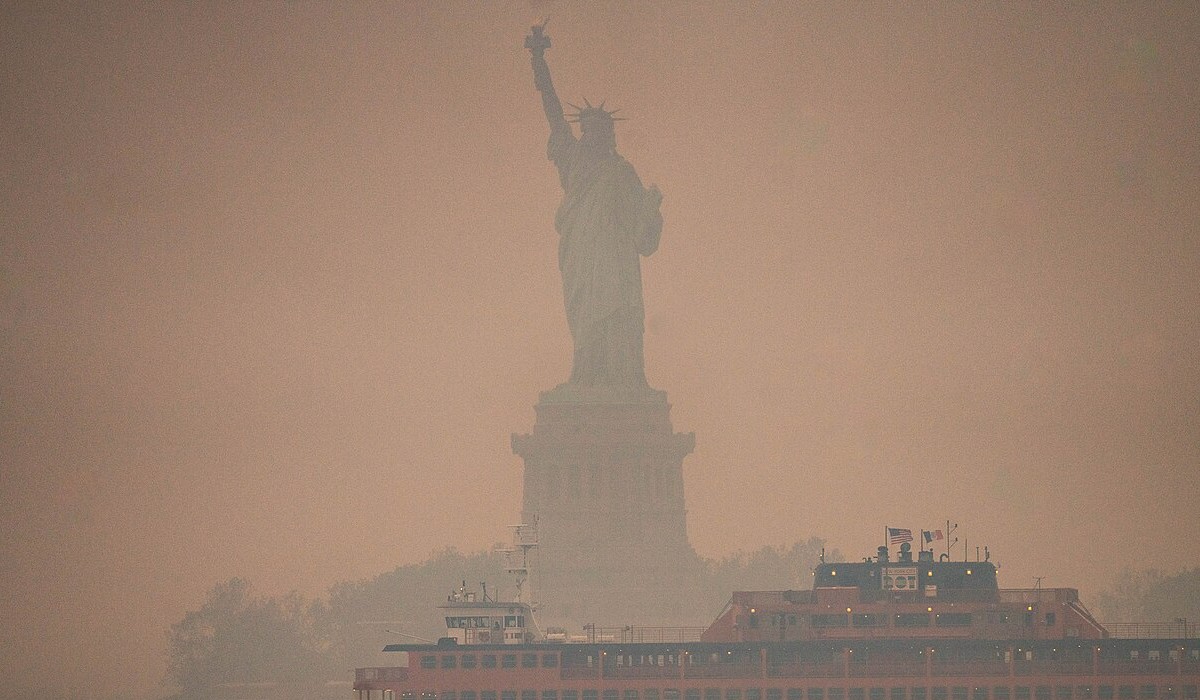 New York consumed by smoke from Canadian wildfires, June 2023. Photo: Anthony Quintano / Flickr / CC BY 2.0
New York consumed by smoke from Canadian wildfires, June 2023. Photo: Anthony Quintano / Flickr / CC BY 2.0
The political perspective of the climate movement must reflect the gravity of the crisis, argues John Clarke
The intensifying impacts of climate change are all around us. Moreover, the storms, floods, wildfires, heatwaves and droughts that now impact our lives as never before are being rendered all the more dreadful by the knowledge that the situation is going to get far worse.
Though scientists have appreciated the general factors driving climate change for decades, the web of causality that is built into the environmental crisis has been insufficiently understood. Today, the impacts of climate change are becoming disastrous causes of its intensification.
Carbon emissions warm the climate and, when parched forests burn on a massive scale, the emissions that are given off worsen the crisis. The term ‘tipping point’ and the notion of points of no return take on a horrifying significance in this regard. Yet, even as CO2 levels reach new peaks, carbon is released into the atmosphere without respite. As the planet heats up, capitalism is literally pouring oil on the flames.
These days, crude climate denial is largely out of fashion in the corridors of power. Governments, institutions like the World Bank and the IMF, and even the CEOs of fossil-fuel companies will acknowledge that climate change is real. However, they duck and weave, delaying meaningful and timely action while promoting fake solutions.
World leaders gather at summit after summit to produce empty rhetoric, false assurances and pitifully inadequate measures. Tech fixes, like carbon capture, are presented as solutions, so that fossil-fuel interests may buy time and continue on their destructive, though profitable, course.
We are told that a massive round of destructive mining operations, devoted to the production of private electric vehicles, can solve our problems when the rapid development of adequate and fully accessible systems of public transport is a necessity.
As populations are hammered by the effects of climate change, no serious steps are taken to put in place the protections and responses that will be essential in the situation that is developing. Even in the wealthier countries, the impacts of extreme heat, floods and air pollution caused by massive wildfires are producing dire results.
In the countries of the Global South, which contribute very little to the climate crisis, however, hundreds of millions of people face abandonment in the face of storms, droughts and floods, as public lending agencies and private banks demand and compel huge and utterly obscene levels of debt repayment.
It’s our fight
It is becoming ever more apparent that climate disaster will transform the class struggle in important ways. Not only will our fights and objectives be shaped by the impacts of the environmental crisis, but the struggles we take up will be more and more shaped by the needs of survival.
Extreme heat is becoming a massive health and safety issue for enormous numbers of workers that must be addressed. As with the pandemic, climate impacts will create situations where employment is interrupted for sustained periods. Adequate income-support systems must be put in place to ensure that those so displaced aren’t thrown into poverty and destitution.
At the community level, public healthcare systems must be strengthened to deal with the health impacts of the climate crisis. Heatwaves require the setting up of networks of cooling centres. Emergency response capacities to deal with storms and flooding must be greatly improved.
On a global level, poor countries must have the resources they need to respond to climate impacts and to rebuild in the face of them. The repudiation of debt is an essential measure and racist border regimes must be dismantled in the face of an inevitable and massive growth in the numbers of climate refugees.
As we take up the struggles that are needed to survive climate impacts, it is utterly vital that we build the movements and develop the forms of action that can greatly reduce the reckless worsening of the situation. Strikes and mass disruptive action must force capitalists and state powers to reduce emissions and transition to alternative sources of energy on a timetable set by the needs of our survival, and not the profits of capitalists.
Above all else, we must have climate movements that are driven by a political perspective equal to the needs of the crisis.
Capitalism’s drive to accumulate and its competitive pursuit of short-term profits are completely incompatible with a sustainable relationship with the natural world. Without appreciating this, we can neither properly understand the problem nor work effectively for the necessary solutions.
Though we must organise around immediate demands and unite in action despite our differences, we must also be clear that we need a society that is very different to the one we are confronting. A rational and just reorganisation of production and consumption is vital and a climate movement with socialist objectives is essential.
Before you go
Counterfire is growing faster than ever before
We need to raise £20,000 as we are having to expand operations. We are moving to a bigger, better central office, upping our print run and distribution, buying a new printer, new computers and employing more staff.

